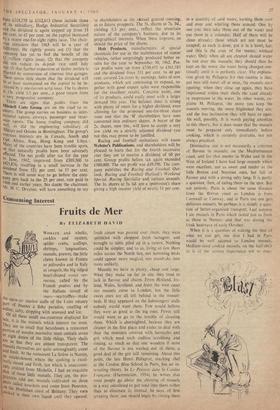C Onsuming Interest
Fruits de Wier
By ELIZABETH DAVID WINKLES and whelks, cockles and oysters, spider crabs, scallops, shrimps, langoustines, mussels, prawns, the little clams known in France as palourdes and in Italy as vongole,the big ridged heart-shaped veluts ver- rucosa, called by the French praires and by the Italians tartufl di mare—sea truffles---make the open-air market stalls of the Loire estuary Port of Nantes a fishy paradise, smelling of iodine, salty, dripping with seaweed and ice. Of all these small sea-creatures displayed for sale, it is the mussels which interest me most. They are so small that hereabouts a restaurant Portion of mottles mariniere must contain seven Or eight dozen of the little things. Their shells are so fine they are almost transparent. The mussels themselves are quite unimaginably sweet and fresh. At the restaurant La Sirene in Nantes, an establishment where the cooking is excel- lently sound and fresh, but which is unaccount- ably omitted from Michelin, I had an exquisite dish of these Iittle mussels. They are, the pro- PlIeEress told me, mussels cultivated on those DO,StS called bouchots and come from Penesten, (,11 the Isjorbihan coast of Brittany. They were Looked in their own liquid until they opened; fresh cream vas poured over them; they. were sprinkled with chopped fresh tarragon; and brought to table piled up in a tureen. Nothing could be simpler; and to us, living so few short miles across the North Sea, not humming birds could appear more magical, nor mandrake root more unlikely.
Mussels we have in plenty, cheap and large. What they make up for in size they tend to lack in flavour and charm. From Holland, Ire- land, Wales, Scotland, and from the west coast our mussels come to London, but the little sweet ones are all left behind in the mussel- beds. If they appeared on the fishmongers' stalls nobody would want them. Few would believe they were as good as the big ones. Fewer still would want to go to the trouble of cleaning them. Which is shortsighted, because they are cleaner in the first place and easier to deal with than the monsters covered with barnacles and grit which need such endless scrubbing and rinsing, so much so that one wonders if most of the flavour is not washed out of them, a good deal of the grit still remaining. About this point, the late Henri Pellaprat, teaching chef at the Cordon Bleu School in Paris, has an in- teresting theory. In Le Poisson darns la Cuisine Fraucaise (Flammarion, 1954), he writes that most people go about the cleaning of mussels in a way calculated to put sand into them rather than to eliminate it; instead, he says, of first scraping them, one should begin by rinsing them in a quantity of cold water, turning them ever and over and whirling them around: One by one you then take them out of the water and put them in a colander. Half of them will be clean already; those which are not must be scraped; as each is done, put it in a bowl, but, and this is the crux of the matter, without water. Only when all are cleaned should water be run over the mussels; they should then be kept on the move, the water being changed con- tinually until it is perfectly clear. The explana- tion given by Pellaprat for this routine is that, put into stilt water all at once, the mussels start opening; when they close up again, they have imprisoned within their shells the sand already in suspension in the water. In other words, ex- plains M. Pellaprat, the more you keep the mussels moving, the more frightened they are; and the less inclination they will have to open. Ah well, possibly. It is worth paying attention to this theory, but it does mean that the mussels must be prepared only immediately before cooking, which is certainly desirable, but not always practical.
Diminutive size is not necessarily a criterion of flavour in mussels; on the Mediterranean coast, and for that matter in Wales and in the West of Ireland t have had large mussels which were excellent, not as sweet and tender as the little Breton and Norman ones, but full of flavour and with a strong salty tang. it is partly a question, then, of eating them on the spot. But not entirely. Paris is about the same distance from the Breton coast as London is from Cornwall or Conway, and in Paris too one gets delicious mussels. So perhaps it is simply a ques- tion of better-organised transport. Last autumn 1 ate mussels in Paris which tasted just as fresh as those at Nantes—and that was during the freak heatwave of early October.
When it is a question of making the best of what we can get, one dish I had in Paris would be well adapted to London mussels. Medium-sized cooked mussels, on the half-shell (it is of the utmost importance not to over- cook them in the first instance), were spread with a garlic and shallot butter, made in much the same way as for snails or for the Breton palourdes farcies (which also, like snails, are ,old ready stuffed for cooking on the Nantes tish stalls) and were arranged on snail dishes, the mussels and the butter protected by a layer of breadcrumbs, an addition of fresh, unthick- ened cream and a sprinkling of coarsely grated Gruyere. Quickly cooked in a hot oven, this is a sizzling, bubbling, richly flavoured dish.
The proprietress of the restaurant, Chez Maria in the rue du Maine, is half-Norman, half- Breton; very likely she is the cousin or the sister-in-law of the lady in charge of the left- luggage office at the Care Montparnasse who had directed me to the little restaurant; perhaps, arriving by train from her native shores, she never travelled much farther than the station. There are many such people running just such restaurants or cafes in Paris. Anyone who wants to eat French regional specialities in the capital without paying the high prices of the fashionable Burgundian, Provençal, Auvergnat, Breton, Al- satian or Savoyard restaurants (in which three out of every five people eating are going to write the place up for a guide book or are begging recipes from the understandably blasé owners) could do worse than search round about, or in- quire at. the main-line stations serving these provinces. There is always a sprinkling of small places owned by people like Maria; they can afford to provide their clients with a few genuine regional products at reasonable prices because they receive them direct by rail—by- passing the markets, the wholesalers, the double transport bills—from relations who are growers, poultry breeders, charcutiers, wine producers, fish-dealers (Maria had spanking fresh sardines the day 1 was there, served grilled and with a half-kilo of Breton butter on the table). The cooking in these places, although on the rough side and limited in choice, is likely to have a more authentically country flavour than that in the well-known bistros and restaurants where the proprietor has sophisticated his recipes to suit chic Parisian taste. By this I do not mean that these re-created dishes are necessarily any the worse; they are just more evolved, less innocent. Take, for example, another mussel dish, this one from an elegant, typically Parisian and rather expensive establishment called the Berlioz, in the rue Pergolese, not a specifically regional restaurant, but one in which a number of provincial dishes are cooked—and well cooked. Here I ordered, from the menu, moules mariniere. When they came, the mussels were those same delicious little Breton creatures, a great tureen of them. The sauce was yellow, just barely thickened, very light and subtle. It was, the patron told me, the result of mixing the mussel liquid with sauce hollandaise. It was delicious. It was perfection. What it was not was the primitive moules mariniere known in every seaport cafe and to every housewife around the entire coastline of France.































 Previous page
Previous page